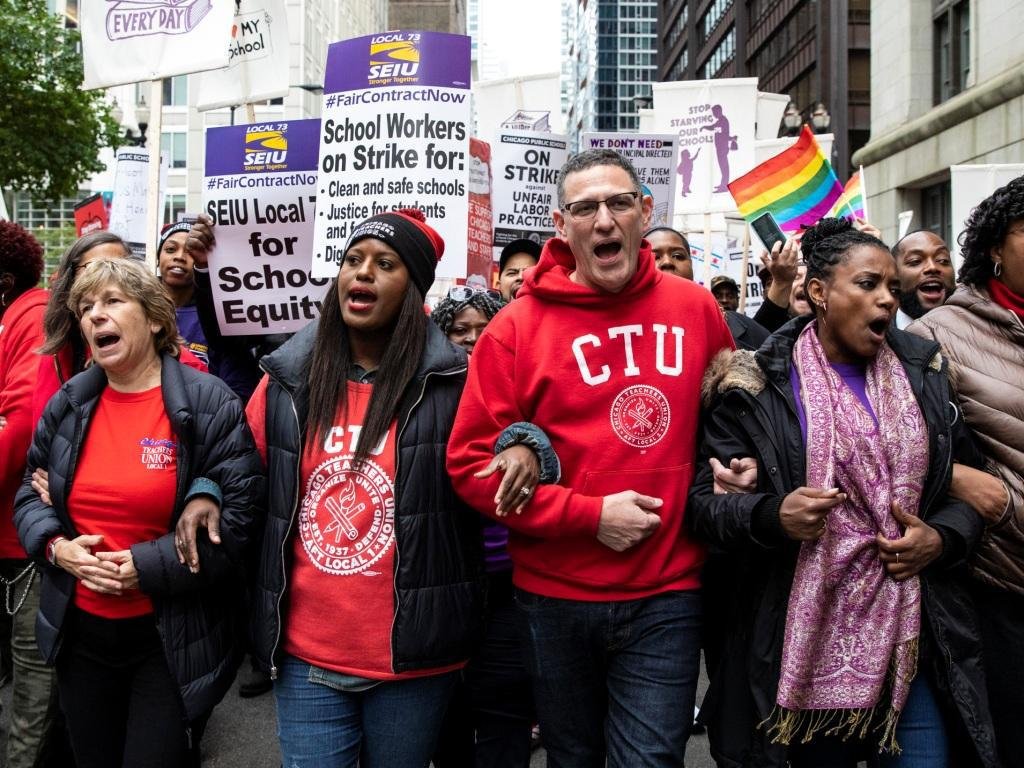#4 Finding: The Chicago Teachers Union Plays a Critical Role Yet Stays in the Background
About Teachers Unions
The American Federation of Teachers (AFT) was founded in Chicago on April 15, 1916, by founders John Dewey and Margaret Haley. It is the second largest teachers’ union in the country affiliated with the labor union to help educators (its members) obtain better wages, pensions, sick leaves, academic freedom, and other benefits. Through the Depression and war years, the AFT fought many struggles such as economic and job insecurity, tenure laws, and academic freedom. Today, the AFT represents 1.7 million members across 3,000 local affiliates. While the AFT serves its purpose to represent its educator members, in recent years AFT has faced new challenges and scrutiny from taking on strikes and reform during the reopening of schools from the COVID-19 pandemic.
About CTU, Local 1
The Chicago Teachers Union (CTU, Local 1) is a labor union that represents educators (teachers, paraprofessionals, and clinicians) in the Chicago public school system. The CTU played an important role in uniting several teachers' organizations in Chicago in the wake of a teachers' revolt against banks during the Great Depression. It was later charted in the 1930s as Local 1 of the American Federation of Teachers (AFT), in which it played a founding role.
Today, the Chicago Teachers Union (Local 1) ranks 7th on the listing of AFT locals and affiliates with 28,000 members and has a strong ongoing connection with AFT at a national level given its founding roots in Chicago. Throughout the years and more recently in the Chicago Mayoral race, the CTU has been scrutinized for its political donations to campaigns of local, state, and federal candidates. Between 2010 and January 2023, the CTU/ AFT Illinois made $17 million in donations to political campaigns. The CTU also contributed an additional $2.7 million to the Chicago Mayoral race in support of Brandon Johnson, a former CPS teacher and CTU organizer. Prior to his running for Chicago Mayor, Johnson was a CTU legislative coordinator and a member of the Cook County Board.
In addition to the CTU getting visibility for its political influence, the Covid-19 pandemic also demonstrated the challenges the CTU brought to Chicago Public Schools and the families it serves. For example, in light of returning to in person learning during COVID-19 in 2022, CTU members voted to pause in person learning and teach remotely due to “safety concerns”, and the return of teachers to schools unless CTU demands were met. As a result, the blend of school closings due to the pandemic, teacher strikes, and covid surges, lead to an estimate of 148 closed school days. In addition, recent census data shows the drop in enrollment because parents sought out education solutions elsewhere, like private schools and the Chicagoland suburbs.
Lastly, there has been some disdain for the role of the CTU possibly influencing the teacher performance ratings while data shows that CPS students are underperforming in key learning metrics in English language and Math. For example, in 2022, CPS students scored 20% in English language proficiency vs. 30% statewide schools. For math performance, CPS students scored 15% vs. 25.5% statewide schools. While in 2021, 100% of CPS teachers were rated “proficient or excellent”, 2022 showed a shift to 83.7%.
In the Background
Our research team spent countless hours researching the role of teachers unions; their messaging; their membership benefits; the leadership team history and their ability to galvanize their membership in support of their priorities. We eventually deduced that while the Chicago Teachers Union may intend to prioritize the families, children, and their education, it is our intention to demonstrate to the community at large that the role of the CTU - both presently, and since its founding - is to represent the interests of their membership (the adults/employees/teachers). The remaining elements of the report will demonstrate that the Chicago Teachers Union plays an immense role in how and what decisions are made that impact the handling of educator misconduct.
However, given this immense role, the Chicago Teachers Union tends to stay in the background when it comes to the parent community, instead getting involved in litigious situations impacting the school board and negotiations made with the administrators. Situations where we get visibility into their tactics include but may not be limited to: funding lawmakers, opposing legislation on witness slip ballots and leading strikes.

